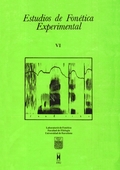El vocalismo del andaluz oriental
Abstract
In the Thesis entitled The Vowel System of Oriental Andalusian I have carried out a study, as the title shows, on Andalusian vowels; this issue has arisen a great deal of interest among linguists. It deals mainly with a revision of the nominal system and the functioning of plurals. I have focused my study on the phoneme /s/ in final position wich was aspirated at one stage of the language development and subsequently lost. This phenomenon brings about a change in the timbre of the last vowel, and it can be transmitted to the tonic and the rest of vowels in the word. The data needed to carry out my research were obtained during the summer of 1987. I recorded the voices of ninety-one informants from various villages situated in Jaén, Granada and Almeria, in an eight-hour-and-fifteen-minutes tape. AII this material was analised using the instruments available in the Phonetics Lab. at the Faculty of Philology located in Barcelona. 19930 data were collected, and sttatistically analysed. I came to the conclusion, plural words in oriental Andalusian can be said to have harmony vowel, even when two vowels occur together in middle position; however this rule does not apply to /i/ and /u/ ocurring in stressed or final position; on the other hand, we could also state that the Andalusian consonant system possesses a large number of odd features.
Downloads
Published
How to Cite
Issue
Section
License

This work is licensed under a Creative Commons Attribution-NonCommercial-NoDerivatives 4.0 International License.
All articles published online by Estudios de Fonética Experimental are licensed under Creative Commons Attribution-NonCommercial-NoDerivs 4.0 International (CC BY-NC-ND 4.0 DEED), unless otherwise noted. Estudios de Fonética Experimental is an open access journal. Estudios de Fonética Experimental is hosted by RCUB (Revistes Científiques de la Universitat de Barcelona), powered by Open Journal Systems (OJS) software. The copyright is not transferred to the journal: authors hold the copyright and publishing rights without restrictions. The author is free to use and distribute pre and post-prints versions of his/her article. However, preprint versions are regarded as a work-in-progress version used as internal communication with the authors, and we prefer to share postprint versions.




